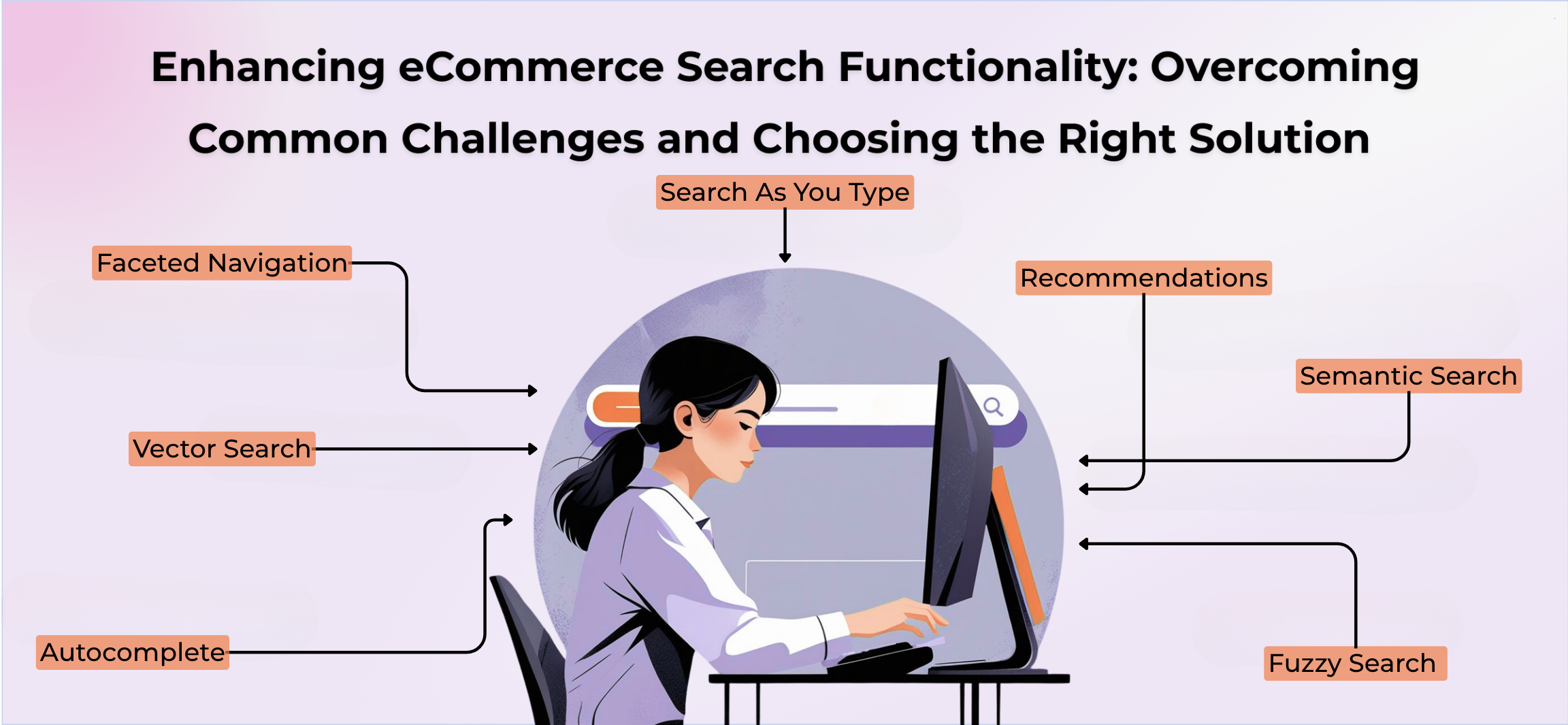
Introduction
Ensuring that an eCommerce business delivers a rapid, accurate and intelligent search experience is essential in enhancing the satisfaction of their customers and achieving conversion. Some online stores on nopCommerce, just like other online stores, have search-related challenges which might be frustrating to shoppers and result in loss of sales. To sustain a competitive advantage in the digital marketplace, it is important to adopt advanced search solutions. Today shoppers are used to finding their products in the blink of an eye even when they misspell them or use different terms. When the search capabilities of a store are poor, it can lose its customers since they might end up leaving their carts and proceed to buy elsewhere. Due to this, sustainability in eCommerce now requires strong search capabilities.
1. Common Pain Points in eCommerce Search
Slow Search Performance
- Customers have instant results in the search for products. Inability to deal with ineffective algorithms or heavy product catalogs can trigger frustration and loss of websites.
- Solution: The optimization of search engines to include in-memory indexing and quick query explosion will result in a tremendous increase in response speed and keep the user more engaged and alleviate the bounce rates. Bad Typo tolerance and Strict Query matching
Poor Typo Tolerance and Rigid Query Matching
- Customers want instant outcomes. Such frustrations may occur because of delays in sites, ineffective algorithms, or excessive inventories.
- Solution: Using faster in-memory indexing and query processing optimized search engines can increase the speed of searching at least ten-fold, keeping the user on their toes.
Irrelevant or Overwhelming Results
- Simple search engines typically demand precision and/or syntactic similarity, such that even small mistakes or wording alternatives may produce no results and restricted product discovery.
- Solution: The use of fuzzy search, typos correction, and synonym identification should be used to ensure that more of the request's land on relevant products to facilitate the satisfaction of the user.
Limited Filtering and Faceting
- Inadequate filtering options prevent users from narrowing results by attributes like price, brand, or color.
- Solution: Adding faceted search and multi-attribute filters empowers customers to refine their searches and find products faster.
Mobile Usability Challenges
- Poor filtering possibilities do not allow a user to filter results by e.g. price, brand, or color.
- Solution: Incorporation of faceted search and multi-attributes filter will enable the customers to narrow down their search, and to quickly find what they are looking for.
Lack of Search Analytics
- In the absence of analytics, merchants do not get access to insights on user actions, lost searches, and inventory-cleaning strategies.
- Solution: By implementing full-fledged search analytics, it is possible to make data-driven decisions and assist merchants in optimizing offerings and reading customer intent.
2. How Modern Search Solutions Address These Challenges
More sophisticated search tools have a comprehensive set of tools that were created to address the above pain points:
- Real-Time Indexing: Indexing that grants search results to be updated in real-time dependent on the latest inventory and product changes.
- Faceted Search and Filtering: Allows the user to refine the results using several attributes to find them more quickly.
- Fuzzy Search and Typo Tolerance: Returns the appropriate results despite a misspelling or similarity.
- Auto-Complete and Instant Suggestions:Accelerates the search process and pins users in popular or pertinent products.
- Vector and Semantic Search: Machine learning to understand the search intent and meaning to provide more personalized results.
- Relevance Ranking and Personalization: Ranks the results according to the interests of the user and the trend of the product.
- Comprehensive Analytics: Monitors search queries, click-through response rates, and failed search activities to continuously optimize.
3. Potential Solutions and Relevant Plugins/Tools
Elasticsearch
High end, big business search technology that can scale, search complex queries, full-text search, and do heavy analysis. It is very flexible, so it is dependent upon technical expertise to set up and maintain it.
Key Features:
- Complex query support for full-text search.
- Large-catalog architecture scaling Scalable architecture taken into account is undoubtedly the first step.
- Long possibilities of filtering and faceting.
- Analytics tool Integration to get insights into search.
Algolia
One of the fastest and most powerful hosted search services that offer cutting-edge technologies such as real-time indexing, typo tolerance, management of synonyms, autocomplete and sophisticated analytics.
Key Features:
- Instant search in millisecond response time.
- Natural language processing and advanced typos tolerance.
- Ranking and relevance tuning options You can customize the ranking and relevance by tuning it using the options available.
- In-line analytics and A/B testing framworks.
Typesense
A simplistic, blisteringly fast and typo-tolerant search engine written in Java. It provides instant search, fuzzy matching, and an API that is easy to use and is therefore a suitable cost-effective search tool to be used by expanding businesses.
Key Features:
- Search speed, typo tolerant and immediate feedback
- Multi-tenancy and faceted filtering
- Easy installation and repairing
Apache Lucene
Apache Lucene is a high-performance, open-source search library in Java, with basic indexing and search functionalities. Lucene is very scalable, and can be used to implement a search solution, but it does take intensive development.
Key Features:
- Effective indexing that is scalable and uses little memory.
- Validates phrase, wildcard, range, and proximity searches.
- Custom relevance models of ranked search.
- Typo-tolerant suggesters, highlighting and faceting.
- Vector similarity: nearest-neighbor search.
- Cross-platform and open-source, and very flexible.
4. Comparative Analysis: Algolia, Typesense, Elasticsearch & Lucidworks Fusion
| Solution | Advantages | Disadvantages | Best Suited For |
|---|---|---|---|
| Elasticsearch | - Built on Apache Lucene, highly customizable and scalable - Powerful analytics and complex query support - Extensive filtering and faceting options | - Complex setup and maintenance - Requires technical expertise | - Large enterprises with technical teams and complex search needs |
| Apache Lucene | - High-performance, full-featured search library - Scalable, incremental indexing with low RAM usage - Supports ranked searching, phrase and wildcard queries, faceting, highlighting, and typo-tolerant suggesters - Open-source and highly flexible Java library | - Not a complete out-of-the-box search solution (library only) - Requires significant development effort to implement and maintain - No built-in distributed search or crawler | - Developers and enterprises needing a customizable, low-level search engine library to build tailored search solutions |
| Algolia | - Extremely fast response times - Advanced typo tolerance - Rich feature set including analytics and A/B testing - Easy integration with many platforms including nopCommerce | - Higher cost, especially for large catalogs | - Medium to large eCommerce stores needing premium, scalable search |
| Typesense | - Open-source and cost-effective - Fast, typo-tolerant search - Developer-friendly RESTful API - Flexible query-time configuration | - Fewer out-of-the-box integrations - Lacks some advanced personalization features available in Algolia | - Growing businesses with moderate budgets seeking flexibility and affordability |
5. Recommendations
- Small to Medium Stores:Typesense has a low-cost model, which is customizable, has great performance, and tolerates typos.
- Medium to Large Stores Seeking Advanced Features: Algolia we will find what we want in case of the user experience, carrying good features and scalable.
- Large Enterprises or Complex Catalogs:Elasticsearch is an exceptional platform in situations where companies need an in-depth customization scheme and the capability to handle large-scale inventories.
Conclusion
Proper search for products is crucial to eCommerce success. Merchants can address some of these pitfalls by using modern search capabilities with real-time information, power filters, autocorrection, autocomplete, analytics, and customizable solutions. The most appropriate one, among them Algolia, Typesense, and Elasticsearch, will be based on the size of your store, technical capabilities, and the expectations of your customers but everything will help you to improve the search experience of your shoppers considerably.








